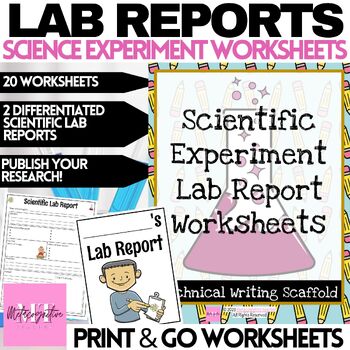Scientific Experiment Lab Report Worksheets for Elementary
- PDF
Description
Introducing our fantastic, no-prep Scientific Lab Report Worksheets, specially designed for elementary students! These print and go lab reports are the perfect solution for busy teachers seeking to provide comprehensive support for students in creating detailed and structured scientific reports. With two lab report workbooks - one simple and one more detailed with a report writing rubric - these worksheets offer a wealth of features to guide students through the scientific process effectively.
Benefits:
- Comprehensive Structure: Our lab report worksheets cover all the essential components of a scientific report, including question formulation, hypothesis, materials, fair testing, procedure, data collection, results, conclusion, and more. Students will develop a thorough understanding of the scientific method and report writing.
- Scaffolded Learning: The two workbook options cater to different learning levels, allowing students to progress from simpler lab reports to more detailed and sophisticated scientific writing. This scaffolded approach fosters confidence and skill development.
- Rubric for Success: The included scientific lab report rubric empowers students to understand evaluation criteria and strive for excellence in their scientific writing. It also streamlines grading for teachers.
- Hands-On Learning: The experiment planning and results sheets encourage students to engage in real scientific experimentation, promoting active and experiential learning.
What's Included:
⭐️ Lab Report Features: Explore the essential elements of a scientific lab report to ensure students understand the components they need to include.
⭐️ Lab Report Writing Features: Help students develop effective writing skills specific to scientific reports, such as clear explanations, accurate data representation, and scientific language.
⭐️ Experiment Planning Sheet: Guide students in planning their experiments thoughtfully, promoting organized and structured scientific investigations.
⭐️ Experiment Results Sheet: Encourage students to record and analyze their experiment results, fostering critical thinking and data interpretation.
Lab Report Workbook One:
⭐️ Question: Formulate relevant scientific questions to investigate.
⭐️ Materials: List the materials required for the experiment.
⭐️ Fair Testing: Explore the importance of fair testing and how to ensure reliable results.
⭐️ Prediction: Make educated predictions about the experiment's outcome based on scientific knowledge.
⭐️ Method: Outline the step-by-step procedure to conduct the experiment.
⭐️ Data Collected: Record data accurately during the experiment.
⭐️ Results: Present the experiment's results in an organized manner.
⭐️ Conclusion: Analyze the data and draw meaningful conclusions based on evidence.
⭐️ Additional Notes: Provide additional observations or insights gained during the experiment.
⭐️ Photographs: Include visual documentation of the experiment.
Lab Report Workbook Two:
⭐️ Question: Formulate relevant and specific research questions.
⭐️ Materials: List all necessary materials, emphasizing precision in scientific investigations.
⭐️ Fair Testing: Understand and implement fair testing principles for accurate results.
⭐️ Hypothesis: Formulate testable hypotheses based on scientific knowledge and prior research.
⭐️ Procedure: Develop a detailed experimental procedure with clear instructions.
⭐️ Scientific Drawing: Create accurate and informative scientific illustrations.
⭐️ Data Collected: Record and organize data meticulously.
⭐️ Results: Analyze data and present findings with appropriate graphs or charts.
⭐️ Conclusion: Interpret results and draw scientifically sound conclusions.
⭐️ Citations: Recognize and reference external sources used in research.
⭐️ Photographs: Capture visual documentation of the experiment.
⭐️ Scientific Lab Report Rubric: Evaluate and provide feedback on students' lab reports using the rubric, promoting self-assessment and continuous improvement.
Ways to Use This Resource:
- Report Writing Unit: Integrate these lab report worksheets into a comprehensive unit on report writing, offering students practical experience in scientific communication.
- Science Fair: Prepare students for science fairs by guiding them through the scientific process and report writing.
- Science Projects: Utilize the worksheets for individual or group science projects, encouraging students to explore their scientific interests.
- Science Week: Enhance Science Week activities with hands-on experiments and detailed scientific reports.
- Literacy Centers or Stations: Incorporate the worksheets into literacy centers to offer students focused and independent scientific writing practice.
- Independent Practice: Encourage students to work through the lab report worksheets independently, promoting self-directed learning.
- Small Group Work: Facilitate collaborative learning experiences in small groups, allowing students to discuss and analyze their experiments together.
- Whole Group Work: Engage the entire class in interactive discussions and activities centered around scientific experiments and report writing.
- Writing Assessments: Use the scientific lab report rubric to assess students' writing skills, providing valuable feedback for improvement.
With our Scientific Lab Report Worksheets, you'll empower students to become confident and articulate scientific writers. They'll gain valuable experience in the scientific process, research, and communication, nurturing critical thinking and analytical skills. Perfect for a range of lessons, assessments, science projects, and science fairs, this resource is an invaluable addition to any elementary classroom.
Common Core Standards:
⭐️ W.4.2. - Text Types and Purposes
⭐️ W.4.2.a - Text Types and Purposes
⭐️ W.4.2.b - Text Types and Purposes
⭐️ W.4.2.c - Text Types and Purposes
⭐️ W.4.2.d - Text Types and Purposes
⭐️ W.4.2.e - Text Types and Purposes
To see when I post new activities Follow Me for updates.
******************************************************************************************
Want to earn FREE MONEY on TPT?
When you leave a review, you'll earn 5¢ for every $1 you spent on TpT for that resource. That's FREE MONEY you can apply to future TpT purchases!
******************************************************************************************
Linked Products:
Mock Trial Opening and Closing Statement Mentor Texts & Worksheets
Best Candy of All Time Persuasive Writing Mentor Text & Worksheets
News Article Planning & Writing Resources
******************************************************************************************





